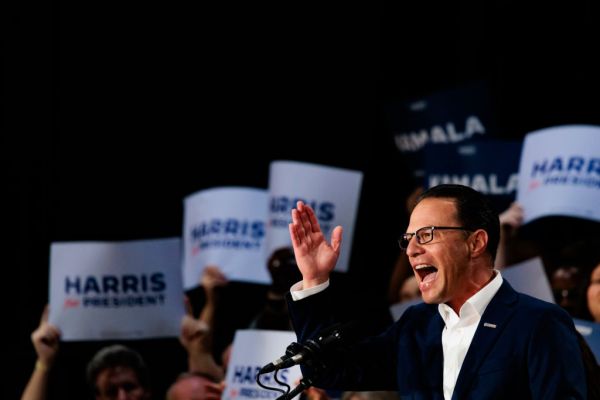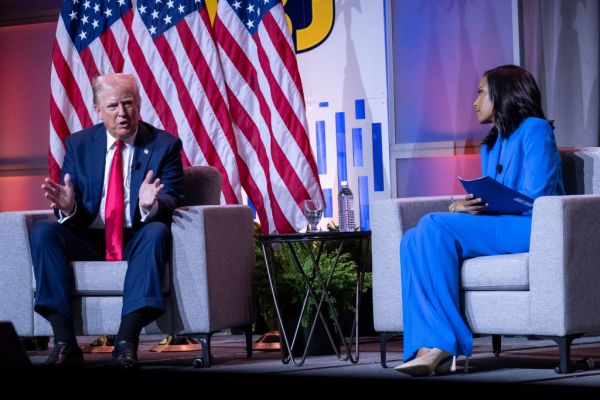For the second time in three weeks, it’s the worst people in a major political party who are most excited about that party’s new vice presidential nominee.
The obvious choice to join Kamala Harris on the Democratic ticket is not the choice Harris ended up making. I warned you that she’s not good at politics, her auspicious performance over the last few weeks notwithstanding.
Those of us who preferred Pennsylvania Gov. Josh Shapiro will be tempted to treat Harris’ selection of Minnesota Gov. Tim Walz as a terrible error. It isn’t. Walz does have his charms. I can be talked into believing that he’ll do more good than harm for his party as a national figure, although I’m strongly inclined to believe that he won’t matter at all.
Not mattering would be par for the course for vice presidential nominees, as Donald Trump recently—and correctly—observed. But par for the course counts as a mistake when the alternative to Walz was someone who might plausibly have tipped the balance in the state that’s most likely to tip the balance in the national election.
What’s outright depressing about the Walz pick is this: It seems to have come down to “vibes.”
“The Minnesota governor’s ascension to the VP slot marks the first time that TikTok has helped choose a running mate,” Sam Stein and Andrew Egger wrote today at The Bulwark. Walz caught fire online last month when he mocked Trump and J.D. Vance for being “weird”; the left relished the critique, took a shine to Walz’s progressive credentials, and rallied around him as a dark-horse alternative to the suspiciously centrist (and Semitic) frontrunner Shapiro.
In three weeks, largely on the strength of one “viral diss,” he went from near-obscurity to joining the Democratic ticket. “Very Trumpian to pick the guy who killed it in his cable news hits,” New York Times columnist Ross Douthat dryly observed. Damon Linker was less dry: “Rather than pick the very popular governor of a neck-and-neck must-win purple state, Harris chose a dime-a-dozen blue-state governor who gives feels to progressives. That’s about what I’d have expected from her a month ago.”
It’s about what I’d have expected from her a month ago, too. Kamala Harris is who we thought she was: someone who’s not very good at politics.
Not very good. But not terrible, either. There are things to like about choosing Walz.
The good.
It’s been ages since Democrats had someone on the ticket who could credibly pass for an average joe.
The closest thing they’ve had this century is Joe Biden, but Scranton Joe has served in public office since he was 28 years old and became a U.S. senator before I was born. He’s the dictionary definition of a professional politician. He might hail from the working class, but a man who’s spent a thousand years in Washington has shed most of his claim to being “relatable.”
Walz is relatable. He spent his younger adulthood as a schoolteacher and Army National Guardsman and didn’t enter politics until his 40s. If regular-guy “vibes” helped John Fetterman win a Senate seat in Pennsylvania, Walz’s far more authentic regular-guy “vibes” could conceivably help Harris carry that state and other battlegrounds.
I said my piece on Monday about Walz’s beer-track appeal in a party run by and for wine-trackers, so here’s progressive pundit Brian Beutler making that point his way:
The biggest problem with Harris-Shapiro is that they’re too similar. The Democratic Party is already over-indexed on polished coastal elite lawyers. You can’t capture the full diversity of the party on a ticket of two people. You get closer with a woman of color and a white man. You get closer still if they arose out of different professional cultures. A Democratic Party that presents itself as the natural home for educated elites, normies, rule-of-law types and farmers, small-town dwellers, teachers, etc. will be stronger than one that’s excessively identified with buttoned-up types. This is why Obama picked Biden and Biden picked Harris.
Democrats desperately need some populist juice, especially with a black woman lawyer from San Francisco leading the ticket, and Walz supplies more of it than Josh Shapiro could. Beutler’s analogy between him and Biden is astute: In both cases, a white guy with a common touch and blue-collar roots helps “balance” a nonwhite elite nominee, reassuring wary downscale white voters that they can trust him or her. For Harris, it’s relatability to “real America” by proxy. If Walz uses his acceptance speech at the convention to champion a left-populist economic agenda for America, maybe he’ll give some Trump-leaners in the Midwest something to think about.
Walz does something else for Harris that’s potentially important, providing cover on her left flank so that she can pivot toward the center on policy.
Many people, including me in yesterday’s newsletter, have noted the irony of progressives’ antipathy to Shapiro. “As VP, Shapiro wouldn’t be setting policies toward Israel. But he would have provided useful cover for whatever Harris wanted to do,” Philip Klein noted today at National Review. “No matter how much hostility she exhibited toward Israel, she would dispatch Shapiro to dutifully spin the policies to Jewish and pro-Israel audiences.”
Choosing the centrist candidate to cover her right flank would have freed Harris to pivot to the left, and not just on Israel. Choosing Walz does the opposite. One can think of the competition between him and Shapiro as a sort of submerged “primary” this year between progressives and liberals who were deprived by the Biden-Harris switcheroo of a chance to battle it out for the Democratic nomination. The VP nomination became their battleground instead, and progressives won.
Now they’ll be expected to be grateful, and quiescent, as Harris reinvents herself as a tough-on-crime, pro-fracking, anti-Medicare-for-all centrist. In one fell swoop, picking Walz has purchased her the enduring enthusiasm of the hard left through Election Day no matter how many flip-flops she executes—or so she hopes. “Walz is the honeymoon-extension choice,” one right-wing activist told New York magazine. “She is picking Tim Walz because [she’s] really enjoying that the entire Democratic Party is unified and is desperate to extend that through the election.”
Walz will probably also fare better than Shapiro would have in the traditional vice presidential role of attack dog on the campaign trail. Shapiro has an Obama-esque above-the-fray persona better suited for a presidential nominee’s pitch about bringing Americans together. Walz is more pugilistic. He’ll spend the rest of the campaign lashing Trump and J.D. Vance as rich pseudo-populist phonies jungled up with corporate plutocrats who don’t give a rip about flyover country. And he’ll enjoy every second of it.
Not a terrible pick. But not a good one either.
The bad.
There are obvious reasons to dislike Walz as VP. Unlike Shapiro and Sen. Mark Kelly of Arizona, he doesn’t hail from an important swing state. (Which, admittedly, might not matter.) And although he only recently turned 60, he looks old—which isn’t great in a campaign where advanced age already rendered one former candidate unelectable.
The core problem with Walz, though, is his record. His “vibes” may be moderate, as one Dispatch colleague pointed out today, but his record is not. And I don’t know if the former can survive as the public educates itself about the latter.
Harris’ great challenge before November is defining herself as a sensible centrist before the Trump campaign can define her as a leftist freak. That’s the goal of her many flip-flops, of course, and it’s why Republicans feared she would choose Shapiro. It would have been hard to convince swing voters that she’s a progressive radical with a centrist running mate standing by her side.
Instead she chose this guy.
Kamala Harris, leftist freak.
She’ll now have to answer for all of the left-wing excesses in Walz’s record as governor, in particular the violence in Minneapolis after George Floyd’s murder in 2020. Not until day three of the protests there did Walz order the National Guard to assist local authorities, a day after their requests for help had come. “Harris-Walz: most left-wing ticket in American history,” Gov. Ron DeSantis tweeted on Tuesday morning. “Minnesota was ground zero for the BLM riots of 2020. Harris egged it on and Walz sat by and let Minneapolis burn.”
One can guess what he meant by ‘egged it on.’” A sharp line making the rounds on Twitter that’ll be picked up soon by the Trump campaign: “The last time Harris and Walz teamed up was when he allowed rioters to burn down half of Minneapolis and then she raised money to bail them out.”
Kamala Harris, leftist freak.
Maybe Walz is so skilled as a retail politician that he’ll break through with Trumpy rural voters despite his many culture-war heresies, but I’m skeptical. Will they overlook his support for sanctuary cities? What about the bill he signed requiring tampons to be provided in girls’ and boys’ bathrooms in public schools?
During the COVID-19 pandemic, Walz mandated masking in most indoor public spaces in Minnesota for almost a year. He also set up a hotline for citizens to snitch on neighbors whom they saw violating his stay-at-home order. How do we think populist voters, allegedly his core constituency, will react to those imperious elite intrusions?
Forget rural voters and populists, in fact. What about center-right conservatives who disdain Trump and were willing to cross the aisle this time, if only Harris threw them a bone with a moderate running mate?
“THANK YOU!” Donald Trump crowed on social media in the hours after Walz was announced as Harris’ pick. And no wonder.
Perhaps Harris will position herself in the center so aggressively that she’ll neutralize Walz’s liabilities—although even in that unlikely case, a VP choice who needs “neutralizing” seems by definition to be a poor one. More likely is that Walz’s record will be taken by voters as reason to doubt the sincerity of Harris’ supposed moderate awakening. By choosing him, she’s signaling that she’s either still a progressive at heart or, at best, is a newbie moderate so timid in her convictions that as president she’ll be strong-armed by progressives into doing their bidding.
“I think that what Tim Walz’s selection says is that Kamala Harris has bent the knee to the far left of her party, which is what she always does,” J.D. Vance said at a rally in Philadelphia on Tuesday. That’s a fair cop, and he won’t be the only one to make it.
Choosing Walz serves as a reminder that populist right-wing freaks aren’t the only ones who can’t face the fact that their brand of politics is unpopular. Watching leftist freaks rejoice that their nominee has saddled herself unnecessarily with baggage about being soft on riots, hard on COVID-19 skeptics, and “weird” on trans issues proves that that phenomenon is bipartisan. “Harris needs to adopt positions that will upset progressive activists,” a worried Jonathan Chait warned Tuesday after the Walz announcement. “She needs to specifically understand that the likelihood a given action or statement will create complaints on the left is a reason to do something, rather than a reason not to.”
Does she understand that? Or has she convinced herself, a la Donald Trump, that the path to victory runs through pandering to the noisiest Very Online chuds on one’s own side? In a world where Glenn Youngkin and Josh Shapiro were the obvious vice presidential picks to expand each party’s tent, we’ve somehow ended up with Vance and Walz.
The ugly.
It’s certainly possible that Shapiro’s Jewish faith played no role in his being passed over as the vice presidential nominee.
Reports are swirling that Harris simply gets along better with Walz, that Shapiro’s job interview with her didn’t go great, and that she and her team had inklings that he might seek to overshadow her if he became vice president. Certainly there’s no reason to think that Harris, who’s married to a Jewish man, personally has any issue with the governor’s religion.
But after the year America has had, one is left to wonder if she felt obliged to “bend the knee” to the pro-Hamas dirtbags of the far left, who surely do have an issue with Shapiro’s faith and might have expressed it come November.
Shortly before news of Walz’s selection leaked on Tuesday, Vance told radio host Hugh Hewitt that, if Shapiro wasn’t chosen, it would be due to “antisemitism in their own caucus, in their own party.”
“I think it’s disgraceful that Democrats have gotten to this point where it’s even an open conversation,” Vance continued. “And it is an open conversation, Hugh. I mean, even if it is Josh Shapiro, the guy has in some ways had to run away from a lot of his biography over the last few months because the far left doesn’t like the fact that he is a Jewish American.”
Vance is a demagogue and an opportunist, but he’s correct that there’s a distinct odor to the left-wing grassroots campaign against Shapiro. Walz is enough of a Zionist to have earned the enthusiastic endorsement of the group Democratic Majority for Israel on Tuesday, yet his stance on the Jewish state was tolerable to progressives while that of “Genocide Josh”—who disdains Benjamin Netanyahu and supports a Palestinian state—was not. Why?
When Vance says it’s an “open conversation” as to whether antisemitism led to Shapiro being snubbed, he’s right about that too. “I can see them looking at the explosion of enthusiasm from young people and being spooked out of nominating [Shapiro] if it risks bringing Gaza back into the conversation,” one Democratic strategist who knows Harris’ team well told Politico before she announced her choice. Liberal pundit Van Jones also felt obliged to acknowledge the elephant in the room during a Tuesday appearance on CNN:
The possibility that left-wing antisemitism is now so rife and potent that it scared Harris away from Shapiro is sufficiently real that even Democrats are discussing it matter-of-factly. The New York Times deemed it worthy of a long news analysis published on Tuesday afternoon, in fact. “We always worry about antisemitism on both ends,” one orthodox rabbi told the paper. “But our greater worry right now is that antisemitism on the left seems to be far more influential on a major party than the antisemitism on the right.”
Maybe it’s a coincidence that the worst people in the Democratic Party all seem to be thrilled to see Shapiro falter. Or maybe it isn’t.
As if that weren’t bad enough, the circumstances of his rejection are so bizarre as to appear almost deliberately insulting.
Last week, Harris’ team announced that she’d welcome her new running mate to the campaign at a rally tonight in—ta da!—Pennsylvania. Yesterday, Shapiro announced that he’d be there. Then, as the selection process played out, Harris’ choices conspicuously narrowed to him and one other dark-horse alternative. Surely, after all those signs pointing to him joining the ticket, she wasn’t going to disappoint voters in the election’s most important state by picking the dark horse instead. To do so would feel like a gratuitous humiliation on the governor’s home turf.
Yet that’s exactly what’s going to happen. Josh Shapiro, the snubbed frontrunner, will have to stand there today and applaud as a guy no one had heard of a month ago gets a hero’s welcome in Philadelphia. I honestly wonder if the optics of it might do Harris more harm than good in a state she absolutely must win.
Imagine that. She was handed a priceless opportunity for a major home-field advantage in this year’s tipping-point state and she handled it so clumsily that she could end up irritating swing voters there on balance. She’s not good at politics.
Even if Pennsylvania voters don’t hold a grudge, it’s anyone’s guess how snubbing Shapiro in such a shabby way will play with Jewish voters specifically and pro-Israel voters more broadly nationwide. The fact that he was the favorite, that the case for choosing him was so strong and obvious, and that Israel’s enemies on the far left prevailed upon her to select a virtual nobody instead might sting, and it should. One new poll out of New York suggests Trump was already leading Harris there among Jewish voters before she chose Walz, and while we shouldn’t rely too heavily on small subsamples, that data point is … provocative.
The only consolation for Shapiro fans is that he might be better off not being on the ticket. If Harris had chosen him and then lost to Trump, the governor would have been tainted as a loser ahead of 2028. Whereas if she had chosen him and won, the new VP would have been stuck in the dismal role of centrist apologist for all manner of left-wing Harris policies, from Israel to more mundane domestic priorities.
The best thing for his career (although not for America’s future) is being passed over and Harris-Walz going on to lose because they proved to be too left-wing. Given how Shapiro has been treated by progressives in all this, I wouldn’t blame him for rooting for it.







Please note that we at The Dispatch hold ourselves, our work, and our commenters to a higher standard than other places on the internet. We welcome comments that foster genuine debate or discussion—including comments critical of us or our work—but responses that include ad hominem attacks on fellow Dispatch members or are intended to stoke fear and anger may be moderated.
With your membership, you only have the ability to comment on The Morning Dispatch articles. Consider upgrading to join the conversation everywhere.